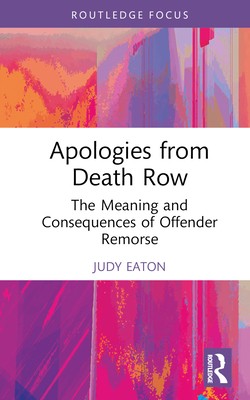
- We will send in 10–14 business days.
- Author: Judy Eaton
- Publisher: Routledge
- ISBN-10: 1032471794
- ISBN-13: 9781032471792
- Format: 14 x 21.6 x 1 cm, kieti viršeliai
- Language: English
- SAVE -10% with code: EXTRA
Reviews
Description
Remorse on Death Row explores the notion of remorse, apologies, and forgiveness within the context of capital punishment in the US, through the final words of offenders on death row, and the co-victims' responses to them in their statements to the press after witnessing the execution.
The book demonstrates that there is evidence that some offenders on death row are truly remorseful and that some of the family members of their victims could benefit from this remorse, but that this is unlikely in the current system of capital punishment. Drawing from the fields of criminology, psychology, and sociology, the book begins with a theoretically informed introduction to the concepts of remorse and forgiveness, followed by an exploration of apology and forgiveness specifically in the context of capital punishment. It discusses how some initiatives within the criminal justice system, such as apology laws and restorative justice programs, are being used to make it easier for offenders to apologize to their victims. Offenders on death row are considered, addressing why they might or might not apologize, and whether they are even capable of showing true remorse. The book then considers the family members of their victims ('co-victims'), addressing whether they benefit from hearing the offender express remorse and witnessing the execution, and whether forgiveness is possible in this context. Evidence to support the arguments presented in the book come from the offenders' final words and the co-victims' responses to them in their statements to the press. The book dispels two common myths about the death penalty. First, it shows that offenders on death row are not simply "monsters" who are incapable of understanding the severity of their crimes. Second, it provides evidence that, despite the popular belief that the death penalty is necessary in order to provide closure for the victims' family members, it may actually have the opposite effect. The family members' statements to the press after witnessing the execution contain more negative themes like anger and disappointment than positive themes like closure and peace. The book concludes with a discussion of the implications this has for systems of justice in general, and how a better understanding of the emotional state of offenders can help both victims and offenders.
Remorse on Death Row will be of great interest to students and scholars of Criminology, Psychology and Sociology.
EXTRA 10 % discount with code: EXTRA
The promotion ends in 21d.07:26:29
The discount code is valid when purchasing from 10 €. Discounts do not stack.
- Author: Judy Eaton
- Publisher: Routledge
- ISBN-10: 1032471794
- ISBN-13: 9781032471792
- Format: 14 x 21.6 x 1 cm, kieti viršeliai
- Language: English English
Remorse on Death Row explores the notion of remorse, apologies, and forgiveness within the context of capital punishment in the US, through the final words of offenders on death row, and the co-victims' responses to them in their statements to the press after witnessing the execution.
The book demonstrates that there is evidence that some offenders on death row are truly remorseful and that some of the family members of their victims could benefit from this remorse, but that this is unlikely in the current system of capital punishment. Drawing from the fields of criminology, psychology, and sociology, the book begins with a theoretically informed introduction to the concepts of remorse and forgiveness, followed by an exploration of apology and forgiveness specifically in the context of capital punishment. It discusses how some initiatives within the criminal justice system, such as apology laws and restorative justice programs, are being used to make it easier for offenders to apologize to their victims. Offenders on death row are considered, addressing why they might or might not apologize, and whether they are even capable of showing true remorse. The book then considers the family members of their victims ('co-victims'), addressing whether they benefit from hearing the offender express remorse and witnessing the execution, and whether forgiveness is possible in this context. Evidence to support the arguments presented in the book come from the offenders' final words and the co-victims' responses to them in their statements to the press. The book dispels two common myths about the death penalty. First, it shows that offenders on death row are not simply "monsters" who are incapable of understanding the severity of their crimes. Second, it provides evidence that, despite the popular belief that the death penalty is necessary in order to provide closure for the victims' family members, it may actually have the opposite effect. The family members' statements to the press after witnessing the execution contain more negative themes like anger and disappointment than positive themes like closure and peace. The book concludes with a discussion of the implications this has for systems of justice in general, and how a better understanding of the emotional state of offenders can help both victims and offenders.
Remorse on Death Row will be of great interest to students and scholars of Criminology, Psychology and Sociology.


Reviews